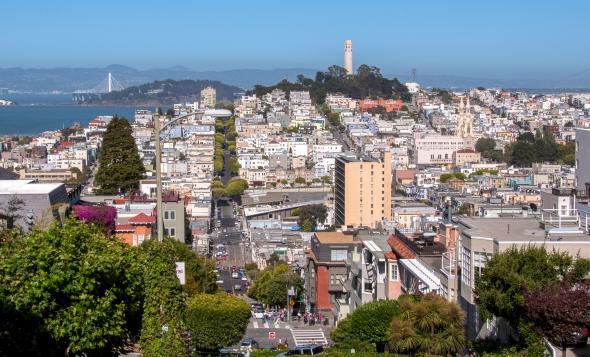In April 2015, a couple from San Jose, California, quietly bought one of America’s most exclusive and expensive streets for a song.
For a measly $90,000, the San Francisco Chronicle reports, Tina Lam and Michael Cheng purchased San Francisco’s tony, private Presidio Terrace. Flanked by mansions that sell in the eight figures, the street has been managed by nearby homeowners—which have included House Minority Leader Nancy Pelosi and California Sen. Dianne Feinstein—since 1905. The purchase, the Chronicle writes, “includes a string of well-coiffed garden islands, palm trees and other greenery,” in addition to the real jackpot: 120 free parking spaces. At a monthly parking rate of $200, the couple could make their money back in a couple years.
What happened here? According to its lawyer, the Presidio Homeowners Association forgot to pay a $14-a-year tax bill because it was being mailed to the wrong address. So the city put the property up for auction. The PHA, in other words, lost a private street in the most expensive city in the country over a paltry $994 in unpaid back taxes, penalties, and interest.
As if the story couldn’t get any richer, Presidio Terrace was whites-only until the 1948 Supreme Court decision Shelley v. Kraemer, which stopped courts from enforcing racial covenants—deeds that stipulated that a property couldn’t be sold to a minority. Now the street itself is owned by a couple of Asian American immigrants.
It’s a hilarious, headline-grabbing example of a much more pernicious practice, in which governments auction tiny tax liens to private investors, who impose onerous interest charges and legal fees in order to foreclose on homes. It’s a tragedy of the financial crisis repeating as farce.
In D.C., an 81-year-old veteran lost his home over a $134 bill. The Washington Post revealed that 500 properties were lost in the city since 2005—“most in the city’s poorest neighborhoods and about one-third from owners who owed less than $1,000,” the Post found. In January, in response to a class-action lawsuit, the District agreed to pay $1 million to those affected.
At the height of the housing crisis, annual property tax delinquencies amounted to more than $15 billion. Desperate to fill municipal coffers, cities and counties sold those debts to investors who did everything they could to seize and flip the properties, taking tens if not hundreds of thousands of dollars in equity for tiny unpaid debts and leaving homeowners homeless. The victims are often poor or elderly. A 2012 report by the National Consumer Law Center documented some of these cases: “An 81-year-old Rhode Island homeowner was evicted two weeks before Christmas from the home she had lived in for more than 40 years because she had fallen behind on a $474 sewer bill. A corporation bought her house at a tax sale for $836.39 and then resold it for $85,000.”
Years later, however, the practice persists. In Flint, Michigan, thousands of residents are at risk of foreclosure for hundreds of dollars in unpaid bills for the city’s undrinkable water. The city has tried to freeze those bills, creating a standoff between Flint Mayor Karen Weaver and the state, which wants its money.
The wealthy homeowners of Presidio Terrace won’t get their street back. But they’re surely awakened, now, to the practice of letting people’s property go quietly to auction for a paycheck’s worth of debt.
Imagine if it was your house instead of your parking spot.
